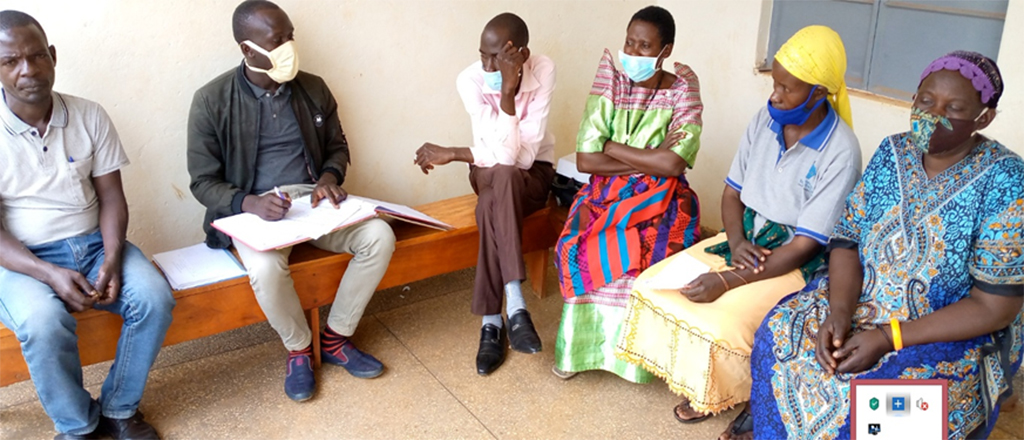
With funding from the President’s Emergency Plan for AIDS Relief (PEPFAR) through the Centers for Disease Control and Prevention (CDC) Uganda, Masaka Diocesan Medical Services Ltd collaborated with RHSP to support provision of comprehensive HIV prevention, care and treatment services in Bukomansimbi district under OVC project
The main objective of the project is to achieve rapid HIV epidemic control in Masaka region through implementation of targeted, user-friendly, innovative, evidence-based, efficient, and sustainable differentiated service delivery models for increased demand, linkage, retention, and adherence to HIV services. Services provided include care for Orphans and Vulnerable Children (OVC)
OVC: To ensure that Orphan and other Vulnerable Children -OVC (0-17 years) remain free from HIV while HIV positive OVC attain viral load suppression (supporting them know their HIV status, linking positive ones to care and supporting them to viral suppression, so as to achieve the 95-95-95].
All interventions focus on empowering families to be the primary line of response to HIV/AIDS care and support.
Target group for OVC project
The target group for OVC project is OVC (0-17 years)/OVC to serve
- Positive children 0-17 years
- Exposed Infants
- Children of Female Sex workers
- Other OVC
Purpose and OVC services
Provide a package of eligible OVC services which include in the 4 domains of safe, schooled, safe, and stable using the standard case management processes
Case Management
- Conduct case management for the eligible OVC beneficiaries as per PEPFAR/MGLSD case management guidance which includes the following steps: (identification, Assessment, Enrolment, Case plan development, case plan implementation, case plan monitoring & follow up, & Case closure. This should be done with standard tools by Ministry of gender or other customized tools in consultation with RHSP
- Support regular follow up of existing OVC cases, monitoring to track progress towards graduation basing on graduation targets
- To collect data on processes and outputs of the program using tools of MoH, MoGLSD and others agreed upon with &RHSP
- Conduct regular assessments to ensure that OVCs achieve the recommended graduation benchmarks
Stable
- Formation of new VSLA groups as per the standard OVC methodology
- Monitor and follow up of existing and new VSLA groups
- Identify, assess and place out of school OVC transitioning into adulthood for apprenticeship training
- Monitor and follow up of the apprentices that are placed with artisans
- Provide toolkits for the graduated apprentices to start income generating activities (IGAs)
- Link the apprentices to community market venues, job market, government livelihood programs.
- Linking OVC caregivers to government wealth creation programmes such NAADS, Youth Livelihood Programme (YLP), Women livelihood fund.
- Ensure that OVC caregivers have the required business and financial literacy skills to run their IGAs
- Provide start up or booster grants in kind to caregivers to start or improve their Income Generating Activities
Safe
- Cascade SINOVUYO (parenting) training to OVC beneficiaries & their care givers use trained facilitators, standard manuals and tools
- Support initiatives for the prevention of violence against children of children and adolescents including gender-based violence
- Identify and Link SGBV/VAC survivors to appropriate support services (psychosocial support groups, health center, police, probation officer etc. ensure that appropriate documentation is done
- Support the OVC birth certificate and National identification registration [NIRA] through referrals.
Healthy
- Identification of HIV positive OVC at the ART health facilities and link them to community social services.
- Support screening of OVC with unknown HIV status for targeted HTS and link to care
- Monitor follow up & document OVC viral load suppression for all OVC Household beneficiaries
- Contribute to community case finding, enrollment and retention for HIV+ children and family members.
- Following up and documenting of OVC caregiver HIV Status.
- Offer ART adherence support to OVC on ART to facilitate viral suppression.
- Support linkage of OVC to other HIV prevention services (DREAMS, VMMC, PEP, etc)
Schooled
- Facilitate access to primary and secondary education through temporary and targeted support.
- Support identification and follow up of eligible OVC in primary and secondary school with school fees and scholastic materials
- Monitoring and follow up of OVC supported to access education for retention and completion
- Provide career guidance to OVC
- Support the education/sensitization of OVC caregivers on the value of education and mobilization of other community resources for education of OVC
Cross cutting Activities;
- Develop and submit work-plans and budgets for review for the scope of work allocated by RHSP.
- Execute activities in accordance with operating procedures and work plans agreed with up with RHSP.
- Participate in District OVC Coordination Committee (DOVCC) and Subcounty OVC Coordination Committee (SOVCC) meetings
- Participate in quarterly review meetings and other program quality improvement and evaluation activities
- Participate in SIMs review meetings/activities
- Provide both financial and narrative monthly, quarterly, annual reports to RHSP on implementation of the assigned activities as per the agreed upon timelines
- Utilize the funds provided by RHSP as stipulated in the sub-award agreement
- Achieve OVC PEPFAR COP20 targets as assigned by RHSP in the district and sub county of operation.
- Documentation of success/impact stories from the implemented interventions on a quarterly basis.
- Provide programmatic and financial accountability for funds and any other resources provided for service delivery according to send standards and timelines
